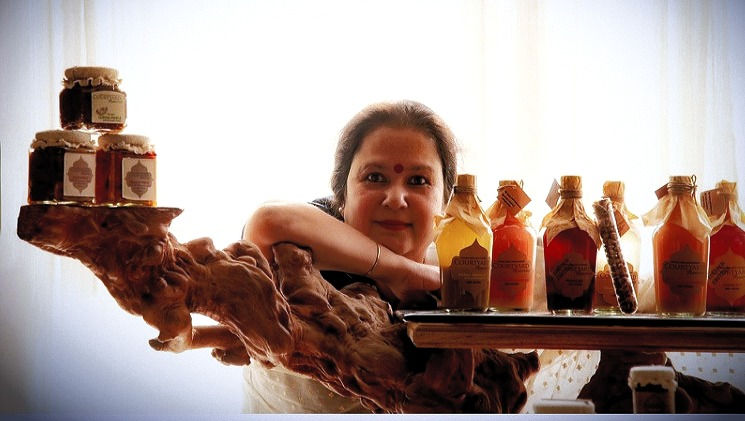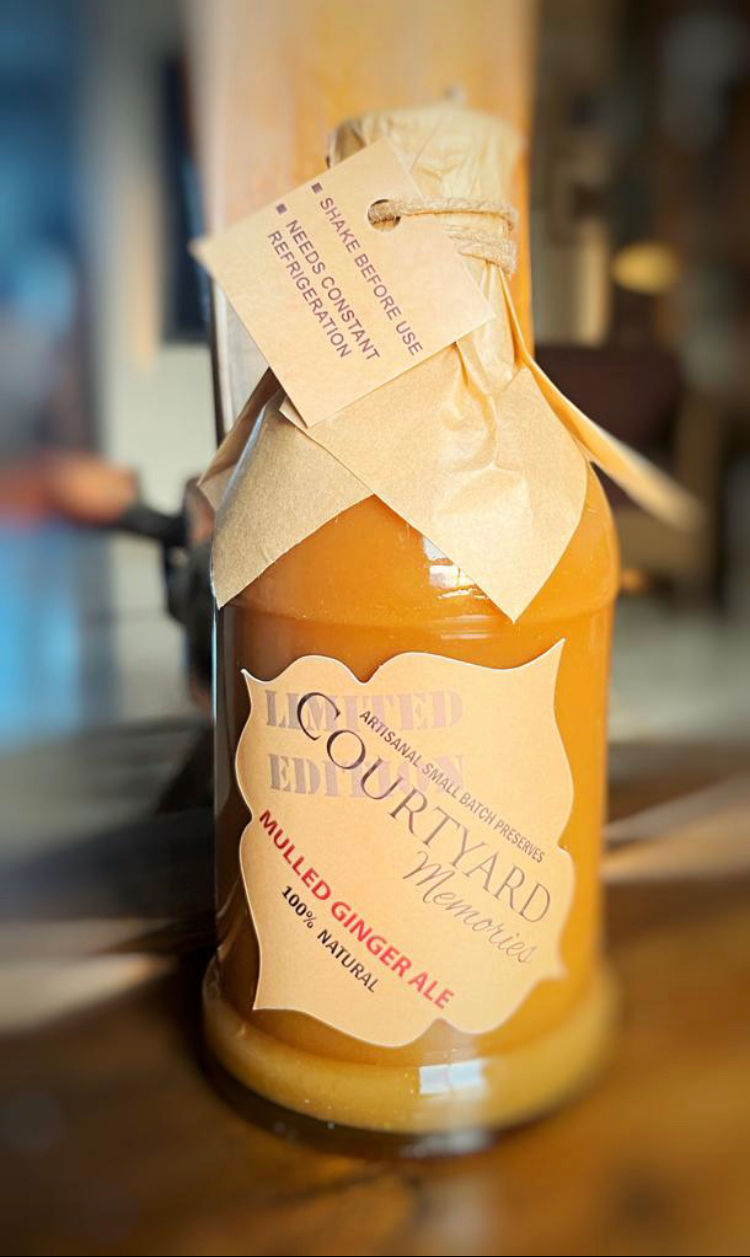By Mihir Srivastava

Pallavi Chatruvedi is a dear friend and an inspiration for she doesn’t settle for the second best. She strives for the best. A good example is Courtyard Memories she founded seven years ago. The objective is to relive our cultural heritage, past by way of flavours and aroma to enrich our palate. Some food, and making of food, is ingrained in our psyche, if not DNA.
In the modern hectic life of a metropolis, we seem to be oblivious of it. For instance, ginger and turmeric are not mere condiments, but an important ingredient that shaped our way of life. They are harbinger of the past in the present. Or in Pallavi’s words, “of cosy winter afternoons, lingering fragrances, sounds of chopping, grating, sifting (these sounds are as much part of growing as the twittering of the birds in the garden) in the backdrop of soft humming of the folklore; old china urns brimming with turmeric tainted mangoes, chillies, lemons, sun and shade, soft muslin cloths and yellowed fingertips.”
I wrote about her four years ago and called her the ‘achari begum.’ She remains one and has become much more in the years that followed.
A good food is not just about how it's tabled, but is a process that involves land, cultivators, culture, and the age-old practices that are in consonance with nature. In that sense food is the story of our civilisation, and Pallavi is ‘naturally’ a food anthropologist. She is interested in food patterns, agriculture, climatic and topography, and a farmer and his life, their traditional practices, and how age-old practices have given various crops a certain character that’s etched in our cultural memory for centuries. Now it’s challenged and threatened. It’s interesting and fulfilling to observe Pallavi interact with a farmer. I get the impression that a food anthropologist is in a conversation with a food scientist. And this good sense that all is not lost, thanks to people like Pallavi.
Therefore, a host of products of Courtyard Memories are organic and steeped in tradition, they are orgasmic to taste buds. Ginger ale is my favourite, Amada ginger ale is the latest sensation, tender Himalayan pickle is to die for, Guava Ginger ale suits my palate, chilli ginger ale goes well with vodka.

I'm intrigued about how obsessed Pallavi can get with the process, “Pickling as an activity that doesn’t happen in a nucleated family. Processed food is an onslaught of chemicals,” she explained to me.
And the ginger of the ginger ale is special and so is the turmeric. The food anthropologist comes alive in Pallavi when ginger is the topic of conversation. Ginger exemplifies her tryst with nature. For she only uses First Flush Tender Himalayan Ginger–is one the finest ginger with a pinkish glow. Pallavi seeks the right balance between tenderness and the taste of ginger.
And it's not easy to procure, it’s a treasure hunt as it is only found in the inner reaches of Himachal Pradesh where cars don’t reach but Pallavi does all the time to source it directly from the farmers. “We sourced the ginger at a pre-harvest stage, when the main bulbs are not fully formed and the ginger is just beginning to acquire its sharp taste,” she explains. She is equally fixated about sourcing other ingredients.
The way they are treated and prepared is akin to art. Done by the local women with rural persona in Noida and Delhi–she has created many job opportunities for women who are in distress for varied reasons. The ginger shoots are first graded, individually hand sliced in square columns of the same size and treated with lime juice. And that lime is not simple lime but is “sourced from a single plantation,” she clarifies, “with thin skin, so that it doesn’t overwhelm the taste of ginger.” This is how ginger pickling is done. But when you adhere to precision of this kind, there’s bound to be a lot of wastage.
Wastage turned out to be a boom, for it was juiced to create Himalayan Ginger Ale, as ginger is “an antioxidant which perks the senses” is an exquisite cocktail mix, and ensures there’s no hangover the next morning. A by-product went on to become the mainstay.

I can take some credit for having participated with her in the making of the mulled ginger ale. Inspired by my German friends and the Christmas season and Glühwein, I often cook condiments in slow flame for an hour in a certain way and add rum instead of wine to serve my friend a soothing warm drink on a winter evening past sundown. I was mighty glad Pallavi liked it so much that she decided to create mulled ginger ale concentrate. She sought my assistance which was readily made available to her. She tried various permutations and combinations in my presence and arrived at the right mix. In the process, I gladly sampled many concoctions. The mulled ginger ale concentrate sells like hotcakes in winters.
There's a lot to choose from when it comes to hydrating drinks for summers or the 'coolants' : Phalsa Ale, Mulberry Ale and Jamun Ale.
Pallavi seeks perfection, and that is demanding on her, there’s no other way for she’s wired in this fashion. And her friends and family are the beneficiaries.
Her husband is one the best news photographers in the country, Bandeep Singh, is also a foodie and a connoisseur of tea. And a partner in crime, his godly capability to decipher ingredients and their right proportion in cooked food blends beautifully with Pallavi’s profound olfactory ability. Bandeep is the quality test for all Courtyard Memories products.
Her quest for perfection is not confined to the products of Courtyard Memories, is also evident in the way she runs her house, takes care of her son, Baahu, mother and mother-in-law. She’s the go-to person for the whole extended family and many of her friends, or simply a trouble-buster par excellence.
Pallavi does the important job of keeping people rooted to their culture and tradition that has shaped them while they take the flight of fancy in a tech-driven urban life. Or simply there can be no AI version of Pallavi or the products of Courtyard Memories.

Comments